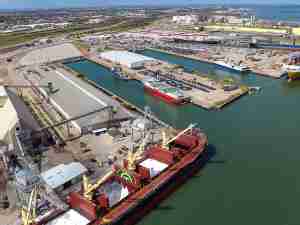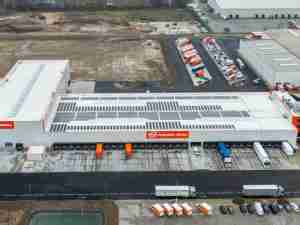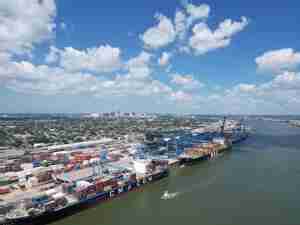dexFreight, providers of a decentralized, blockchain-based logistics platform, today announcedthat it has entered into a contract with the port community of Veracruz, Mexico to perform a proof of concept project for a blockchain-driven port community system. The partnership, which will be led by dexFreight and the Texas A&M Transportation Institute (TTI), is a first-of-its-kind in the Americas and will help define blockchain applications for improving the security and efficiency of freight transportation within the port system. It will also identify ways to streamline the existing processes involving container export from the port.
For the project, dexFreight will build a web-based application for stakeholders (the Mexican Customs Agency, Hutchinson Ports (ICAVE), the Customs Brokers Association, and the Port Authority of Veracruz) to share manifest information and other legal documents, and record events in the export process to smart contracts. The stakeholders will then test the application for several months to quantify benefits in terms of reducing the number of hours required to complete the container export process, examining how blockchain can add accountability and transparency among the stakeholders involved. If successful, the new initiative will lead to the implementation of blockchain technology in the future development of a port community system and connect to many external partners such as banks, software vendors, insurance to service the community.
“The Port of Veracruz is the third largest port in Mexico, so we are thrilled to play a role in this important project. This an incredible opportunity to test the application of blockchain technology in a port environment and set a precedent for similar projects in ports around the world,” expressed Rajat Rajbhandari, CEO and co-founder, dexFreight.
In 2017, the Port of Veracruz moved 1.12 million TEUs, making it the third busiest container port in Mexico and the most important in the Gulf of Mexico. Currently undergoing an increase of its capacity, the port expects the trend of growing container volumes to continue with up to five million TEUs by 2030. For that reason, participants of this project believe the modernization of infrastructure has to be accompanied by the use of newer and better information technologies to power more efficient logistic services through the port, which are considered by some Mexican officials to be the nation’s largest infrastructure investment in 100 years.
“The project and the PCS are critical in improving trade efficiency at the port and being competitive. The aim of the PCS is to reduce the time and effort it takes to securely export and import containers through the port and provide much better service to the private sector customers,” explained Baruc de la Fuente, administrator for Veracruz Customs Agency.
“Blockchain technology adds openness, neutrality and transparency to the PCS,” said Juan Ignacio Fernandez, director of Veracruz Port Administration.
Susana Diaz Virgen, general manager of Hutchinson Ports ICAVE, one of the two terminal operators at the port, mentioned that the project’s objective is to reduce the time required between receiving appointment from customs brokers to actually loading containers and other cargo to a ship by streamlining the overall process and use blockchain to provide accountability among agencies in the process.
During the project kick off meeting in Veracruz, the president of the Customs Brokers Association in Veracruz, Ramon Gomez Barquin, asserted: “The port’s competitiveness is imperative for its long-term success. The community must come together to find innovative technologies, such as blockchain, to enhance the port operation for the benefit of importers and exporters.”







_-_28de80_-_d88095865f9f1cbb4ecdd37edf61c63efd603428_lqip.png)

